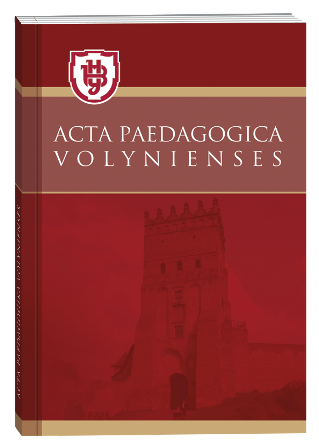THEORETICAL PRINCIPLES OF EDUCATION OF HUMANE BEHAVIOR IN OLDER PRESCHOOL CHILDREN
DOI:
https://doi.org/10.32782/apv/2022.1.1.17Keywords:
moral education, moral norms, humanity, humane feelings and qualities, motives and skills of humane behavior, older preschool childrenAbstract
The article analyzes the essence and features of education of behavior in older preschool children as a set of humane feelings, ideas and motives that are realized in the act as a result of children’s assimilation of moral values, and also provide the gradual formation of relevant experience. It has been found that such behavior of children is a moral norm and is aimed at understanding, awareness and emotional experience of the consequences of compliance/non-compliance with the relevant rules. The factors of formation of humanity are singled out, which is represented both as a motive for behavior and as a moral quality of a preschool child. Such a important mean of educating humane behavior in children, as their interpersonal interaction in the system «child – adult» and «child – peer» is highlighted, which helps preschoolers to learn about the world, learn social experience, get the necessary information and acquire practical skills to communicate, empathize, show friendliness and mutual assistance, compassion, kindness, sensitivity, support. It is characterized the formation of humanity by gradually teaching the child to coordinate own actions with the interests of others, to be responsible for own actions, and also the assimilation of internal acceptance of moral norms, which gradually begin to regulate and motivate his/her behavior. In addition, the pedagogical conditions of effective education of humane behavior of older preschoolers are substantiated, in particular: formation their positive motivation to assimilate basic moral norms, develop humane feelings and qualities, motives and skills of humane behavior in various types of emotional activities and communication; humanistic orientation of the educator’s actions, his professional competence and authority, based on the ability to be sensitive, friendly, tolerant; cooperation of preschool institutions with the families of pupils in the analyzed process, which, on the one hand, will allow to develop the only strategy and tactics in the implementation of their educational function, and on the other – will preserve the uniqueness and features of each institution.
References
Алексєєнко Т.Ф. У чому сутність гуманних взаємин батьків і дітей? Рідна школа. 2001. № 3. С. 33–36.
Базовий компонент дошкільної освіти (Державний стандарт дошкільної освіти): нова редакція. Наказ МОН України № 33 від 12.01.2021 р. URL: https://mon.gov.ua/ua/osvita/doshkilna-osvita/bazovij-komponent-doshkilnoyiosviti-v-ukrayini
Божович Л.И., Конникова Т.Е. О нравственном развитии и воспитании детей. Вопросы психологии. 1975. № 1. С. 80–90.
Виховання гуманних почуттів у дітей / С. Ладивір та ін. ; за наук. ред. Т. Піроженко, С. Ладивір, Ю. Манилюк. Тернопіль : Мандрівець, 2010. 168 с.
Врочинська Л.І. Виховання гуманної поведінки дітей старшого дошкільного віку у процесі взаємодії дошкільного навчального закладу і сім’ї : автореф. дис. … канд. пед. наук : Київ, 2008. 20 с.
Эмоциональное развитие дошкольника: пособие для воспитателей детского сада / под ред. А.Д. Кошелевой. Москва : Просвещение, 1985. 176 с.
Нравственное воспитание в детском саду / В.Г. Нечаева и др. 2-е изд. Москва : Просвещение, 1978. 256 с.
Поніманська Т.І. Теоретико-методичні засади гуманістичного виховання дітей дошкільного віку : монографія. Рівне : РДГУ, 2006. 352 с.
Білан О.І. Програма розвитку дитини дошкільного віку «Українське дошкілля» ; за заг. ред. О.В. Низковської. Тернопіль : Мандрівець, 2017. 256 с.
Федорович А.В. Виховання гуманних почуттів як основа морального розвитку дітей дошкільного віку. Актуальні питання гуманітарних наук : міжвузівський зб. наук. пр. молодих вчених ДДПУ ім. І. Франка. Дрогобич : Посвіт, 2013. Вип. 6. Ч. ІІ. С. 171–177.







